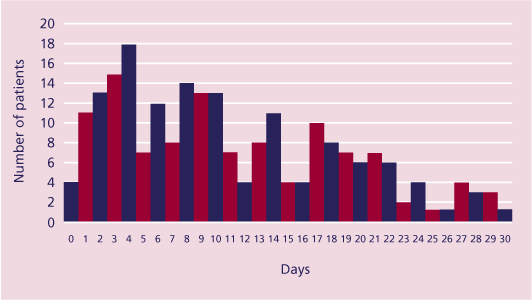| ||||||||||
| ||||||||||
|
COMPLICATIONS AND DEATH
Critical incidents (back to top)
Critical incidents during ERCP procedures were reported in 9% (19/221) of cases (Table 46). However, it is suspected that critical incidents during the procedure were under-reported. Hypotension and tachycardia may reflect pre-procedural pathology such as pancreatitis or septicaemia, but the risk of hypotension should be minimised by optimising the patient’s condition before endoscopy. Tachycardia may be associated with the use of anticholinergic agents to inhibit peristalsis during the procedure. Hypoxaemia should be preventable in most patients, all of whom should receive supplemental oxygen.
| Table 46. Critical incidents during therapeutic ERCP (answers may be multiple) | |
| Critical incident | Total n = 221 |
Hypotension (systolic less than or equal to 100 mmHg) |
7 |
Tachycardia (greater than or equal to 100 beats/min) |
6 |
| Hypoxaemia (SpO2 less than or equal to 90%) | 5 |
| Respiratory arrest | 2 |
| Cardiac arrest | 1 |
| Pulmonary aspiration | 1 |
| Local haemorrhage | 1 |
Other |
3 |
| Total | 26 |
| None | 202 |
| Not answered | 16 |
Postoperative complications (back to top)
| Table 47. Complications in the 30 days after therapeutic ERCP (answers may be multiple) | |
| Complication | Total n = 216 |
Progress of medical condition |
76 |
Sepsis |
57 |
| Respiratory problems | 51 |
| Renal failure | 40 |
| Cardiac problems | 33 |
| Hepatic failure | 16 |
| Upper or lower GI haemorrhage | 9 |
| Electrolyte imbalance | 8 |
| Subsequent related operation | 6 |
| Viscus perforation | 4 |
| Stroke | 2 |
| Haematological problems | 2 |
| Other | 20 |
| Total | 324 |
| None | 56 |
| Not answered | 21 |
In comparison with 'progress of medical condition', the second most common complication following ERCP was sepsis (Table 47). Sepsis may be related to the high incidence of biliary stasis and infection in these patients, coupled with their age, underlying comorbidities and poor physical status. However, it does underline the need for an appropriate antibiotic strategy. There were two complications, perforation 2% (4/216) and haemorrhage 4% (9/216), that were directly attributable to the ERCP, and both of these are the most likely reason for the subsequent surgery in six patients.
Death (back to top)

Figure 15. Number of days between the ERCP procedure and death
37% (88/237) of deaths occurred in the first week and 30% (70/237) in the second week.
One patient died in the endoscopy suite.
| (back to top) |